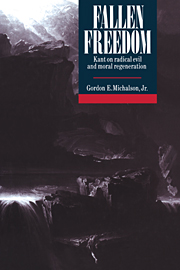6 - Autonomy and atonement
Published online by Cambridge University Press: 15 December 2009
Summary
But godliness is not a surrogate for virtue.
KantThe relation of history to reason remains constitutive for the discourse of modernity – for better or worse.
Jürgen HabermasThe surplus of moral debt
To this point, we have seen a series of difficulties emerge as Kant attempts to show how a fallen freedom can, through its own powers, overcome the effects of its fallenness. These various difficulties fuse into a complex maze as Kant tries to supplement appeals to human effort with appeals to divine activity, but without jeopardizing the element of autonomy required to keep his view recognizably Kantian. Upon inspection, Kant's notion of a mysterious divine supplement to our imperfect efforts at renewal translates into a strategy for motivating a potentially discouraged moral agent; and his appeal to the divine perspective on moral regeneration turns out to beg the very question the appeal seems designed to answer.
But the most severe difficulty facing Kant remains to be addressed. This difficulty arises out of an unavoidable implication of Kant's rigorous emphasis on duty in his depiction of the moral life, and Kant's way of handling the problem produces the most dramatic – and unstable – intermingling of rational and biblical idioms in his entire account of moral regeneration. It is just here that topics such as christology, atonement, and justification make their appearance in Kant's discussion, “like strange visitors from another world,” as Karl Barth once put it.
- Type
- Chapter
- Information
- Fallen FreedomKant on Radical Evil and Moral Regeneration, pp. 107 - 124Publisher: Cambridge University PressPrint publication year: 1990



